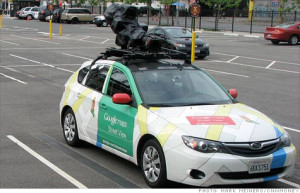A U.S. appeals court upheld a district court decision that Google’s collection of data from unencrypted Wi-Fi networks under its Street View program is not exempt from federal wiretap laws.

Google’s data collection does not qualify for the exemption as data transmitted over a Wi-Fi network is not an electronic communication that is readily accessible to the general public, the U.S. Court of Appeals for the Ninth Circuit ruled Tuesday, giving a go-ahead to a privacy lawsuit against Google.
The Internet giant had argued that its data collection did not violate the Wiretap Act because it fell under an exemption that makes it lawful to intercept electronic communications that are readily accessible to the general public. The three-judge panel held that Wi-Fi network data collected by Google was not a radio communication, which is by definition readily accessible to the general public so long as it is not scrambled or encrypted.
Wi-Fi transmissions are not readily accessible to the general public because most of the general public lacks the expertise to intercept and decode payload data transmitted over a Wi-Fi network, Judge Jay S. Bybee wrote in the opinion. “Even if it is commonplace for members of the general public to connect to a neighbor’s unencrypted Wi-Fi network, members of the general public do not typically mistakenly intercept, store, and decode data transmitted by other devices on the network.”
Between 2007 and 2010, Google equipped its Street View cars with Wi-Fi antennas and software that collected data transmitted by Wi-Fi networks in nearby homes and businesses, the judge observed in the opinion.
Besides collecting the network’s name called the SSID, the unique number or the MAC address assigned to the router transmitting the wireless signal, the signal strength, and whether the network was encrypted, to provide enhanced location-based services, Google’s Street View cars gathered and stored payload data that was sent and received over unencrypted Wi-Fi connections while driving by. This could include information such as personal emails, user names, passwords, videos and documents.
Google acknowledged in May 2010 that its cars had collected inadvertently some personal data from unencrypted networks, and publicly apologized. The company also settled earlier this year for US$7 million with 37 U.S. states and the District of Columbia over its unauthorized collection of personal data transmitted over Wi-Fi networks. Google has faced probes and fines over the data collection in other countries as well.
The consolidated class action charges that Google’s Street View vehicles not only collect images to include in Google Maps and Google Earth, but have technology that intercepts electronic communications and other data transmitted over class members’ wireless network.
“Although technology continually advances, the right to privacy in our homes endures,” said Kathryn E. Barnett of Lieff Cabraser Heimann & Bernstein, one of the law firms working for the plaintiffs, in a statement on the decision by the appeals court.
“We are disappointed in the Ninth Circuit’s decision and are considering our next steps,” Google said in a statement Tuesday.





